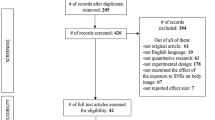Abstract
Three groups of women: eating disorder, body dysphoric controls, and nonsymptomatic controls, participated in an experiment testing hypotheses derived from cognitive-behavioral theories of eating disorders. In phase 1, participants encoded ambiguous information via instructions to imagine themselves in a variety of ambiguous situations that involved two types of information: body-related or health-related. On a subsequent memory task, participants in the eating disorder group and the body dysphoric control group recalled imagery of the body-related situations with a fatness interpretation and participants in the nonsymptomatic control group recalled imagery with a thinness interpretation. The three groups did not differ in their interpretation of the health-related situations. In phase 2, participants were instructed to imagine themselves in each body-related situation, but were explicitly instructed to imagine the scenes with either a positive or negative interpretation. Results indicated that the eating disorder and body dysphoric groups were able to change their interpretation of body-related information when instructed to do so.
Similar content being viewed by others
References
Cooper M.: Cognitive theory in anorexia and bulimia nervosa: A review. Behav. Cognitive Psychother., 25, 113–145, 1997.
Vitousek K.B., Hollon S.D.: The investigation of schematic content and processing in eating disorders. Cognitive Therapy and Research, 14, 191–124, 1990.
Williamson D.A.: Body image disturbance in eating disorders: A form of cognitive bias? Eating Disorders. The Journal of Treatment and Prevention, 4, 47–58, 1996.
Williamson D.A., Muller S.L., Reas D.L., Thaw J.M.: Cognitive bias in eating disorders: Implications for theory and treatment. Behavior Modification, in press.
Dagleish T., Watts, F.N.: Biases of attention and memory in disorders of anxiety and depression. Clin. Psychol. Rev., 10, 589–604, 1990.
Cooper M.: Bias in interpretation of ambiguous scenarios in eating disorders. Behav. Res. Ther., 35, 619–626, 1997.
Cooper M., Fairburn C.G.: Changes in information processing with three psychological treatments for bulimia nervosa. Br. J. Clin. Psychol., 33, 353–356, 1994.
American Psychiatric Association: Diagnositic and statistical manual of mental disorders, 4th Ed., Washington, DC, APA, 1994.
Cooper P.J., Taylor M.J., Cooper Z., Fairburn C.G.: Development and validation of the Body Shape Questionnaire. Int. J. Eating Disord., 6, 485–494, 1987.
Jackman L.J., Williamson D.A., Netemeyer R.G., Anderson D.A.: Do weight preoccupied women misinterpret ambiguous stimuli related to body size? Cognitive Therapy and Research, 19, 341–355, 1995.
Eysenck M.W., Mogg K., May J., Richards A., Mathews A.: Bias in interpretation of ambiguous sentences related to threat in anxiety. J. Abnorm. Psychol., 100, 144–150, 1991.
Kutlesic V., Williamson D.A., Gleaves D.H., Barbin J.M., Murphy-Eberenz K.P.: The Interview for Diagnosis of Eating Disorders IV: Application to DSM-IV diagnostic criteria. Psychol. Assess., 10, 41–48, 1998.
Williamson D.A., Barker S.E., Norris L.E.: Etiology and management of eating disorders. In: Sutker P.B., Adams H.E. (Eds.), Comprehensive Handbook of Psychopathology, 2nd Ed., New York, Plenum, 1993, pp. 505–530
Baker J.D., Williamson D.A., Sylve C.M.: Body image disturbance, memory bias, and body dysphoria: effects of negative mood induction. Behav. Ther., 26, 747–759, 1995.
Sebastian S.B., Williamson D.A., Blouin D.C.: Memory bias for fatness stimuli in the eating disorders. Cognitive Therapy and Research, 20, 275–286, 1996.
Garner D.M., Garfinkel P.E.: The eating attitudes test: An index of the symptoms of anorexia nervosa. Psychol. Med., 9, 273–279, 1979.
Thelen M.H., Farmer J., Wonderlich S., Smith M.: A revision of the Bulimia Test: The BULIT-R. Psychol. Assess., 3, 119–124, 1991.
Garner D.M.: Eating Disorder Inventory-2 Manual. Odessa Fl, Psychological Assessment Resources, Inc, 1991.
Williamson D.A., Davis C.J., Goreczny A.J., Bennett S.M., Gleaves D.H.: Development of a simple procedure for assessing body image. Behav. Assess., 11, 443–446, 1989.
Pollack B.: The validity of the Shipley-Hartford Retreat Test for Deterioration. Psychiatr. Q., 16, 119–131, 1942.
Heymsfield S.B., Allison D.B., Heshka S., Pierson R.N.: Assessment of human body composition. In: Allison D.B. (Ed.), Handbook of assessment methods for eating behaviors and weight-related problems. Thousand Oaks, CA, Sage Publications, 1995, pp. 515–560.
Williamson D.A., Barker S.E., Bertmam L.J., Gleaves D.H.: Body image, body dysphoria, and dietary restraint: Factor structure in nonclinical participants. Behav. Res. Ther., 33, 85–93, 1995.
Fairburn C.G.: A cognitive-behavioural approach to the treatment of bulimia nervosa. Psychol. Med., 11, 707–711, 1981.
Author information
Authors and Affiliations
Rights and permissions
About this article
Cite this article
Williamson, D.A., Perrin, L., Blouin, D. et al. Cognitive bias in eating disorders: Interpretation of ambiguous body-related information. Eat Weight Disord 5, 143–151 (2000). https://doi.org/10.1007/BF03354444
Received:
Accepted:
Published:
Issue Date:
DOI: https://doi.org/10.1007/BF03354444




